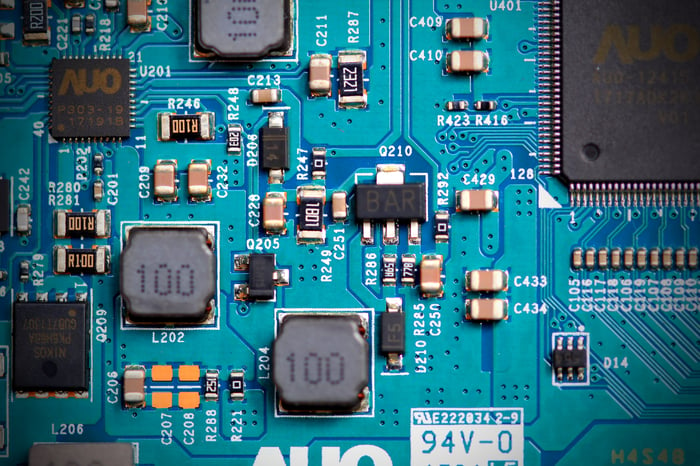In this month’s Sensible semiconductor news update, we take a look at the growth of the semiconductor industry in the United States, concerns about rising tensions between China and Taiwan, the growing revenue for the top 50 EMS companies, and the move towards zero-emission vehicles in the European Union.
US Semiconductor Industry Growing
While the semiconductor was first invented in the United States, today just 10% of the world’s supply is manufactured domestically, and none of the world’s most advanced chips are manufactured in the U.S. That could be set to change in the near future.
Since the CHIPS and Science Act was first introduced in the spring of 2020, more than $210 billion in new private investments have flooded the market, producing some 44,000 new high-quality jobs. The Chips Act was officially signed into law in August 2022, providing about $280 billion in additional funding to boost domestic R&D for semiconductors in the U.S.
The Semiconductor Industry Association (SIA) has mapped nearly 500 locations in 42 states in the U.S. where manufacturing, chip design, IP and software, R&D, and semiconductor materials and manufacturing are taking place.
Currently, there are more than 100 existing manufacturing facilities. The SIA also noted another 17 projects that have been announced and 10 new expansion projects related to semiconductor manufacturing.
Taking a broader view of the entire semiconductor infrastructure across the U.S., SIA counts some 474 existing facilities along with 57 announced new projects and expansions.
Concerns Over China-Taiwan Tension Rise
Taiwan is the world’s largest producer of semiconductors, accounting for nearly 60% of global output and approximately 90% of advanced chip manufacturing. The biggest producers supply chips to Apple, Nvidia, and Qualcomm, among others.
However, increased tension between China and Taiwan has concerned many. China has stated it intends to reunite Taiwan with the mainland and has recently escalated military exercises in the area. Analysts worry about potential military action against Taiwan.
U.S. Secretary of State Antony Blinken told Euronews that a conflict between China and Taiwan would affect every nation on the planet. An invasion or blockade of the Taiwan Strait could cause an immediate disruption to the majority of semiconductors used globally.
Increased conflict comes on top of U.S.-China trade conflicts which continue to impact the semiconductor industry. New export rules and a growing list of Chinese companies added to the U.S. government’s unverified list have impacted the Chinese chip market.
Top 50 EMS Companies Increase Revenue by $40 Billion in 2022
An analysis by Manufacturing Market Insider (MMI) reveals that the top 50 electronic manufacturing services (EMS) companies generated $457 billion in revenue in 2022, a 9.5% increase from 2021. More than two-thirds of the revenue came from the APAC region.
The electronic components industry remains extremely top-heavy. While the top 10 companies saw their market share fall slightly in 2022, they still make up 89% of all sales.
Zero Emissions in the EU by 2035
A rapidly growing segment of the semiconductor industry is tied to the burgeoning market for electric vehicles (EVs). These emission-free vehicles depend upon chips to run the battery cell, module, and pack controllers that ensure accurate charging current and output voltages — and their compliance with automotive and industrial standards.
Against that backdrop, the European Commission voted to make all new cars and vans registered in Europe to be zero emissions starting in 2035. While not every EU nation voted to support the measure. Poland voted against it while Italy, Bulgaria, and Romania abstained.
The new law requires all new cars sold starting in 2030 to have 55% lower CO2 emissions compared to the benchmark established in 2021. By 2035, all new cars sold will need to be emission-free. This points to an inevitable upswing in demand for the chips that help to operate and regulate these vehicles.
Germany was also granted an exemption for vehicles running on e-fuels. These vehicles capture CO2 emissions to balance the CO2 released during engine combustion. Therefore, the law does not ban internal combustion engines that use e-fuels, such as kerosene, methane, or methanol. Such e-fuels synthesize captured CO2 and hydrogen that have been produced using renewable energy or carbon-neutral electricity. While these fuels do release CO2 into the atmosphere during combustion, proponents say they take in an equal amount of CO2 from the atmosphere to make the fuel, effectively making it carbon neutral.
Stay Up-to-Date on Semiconductor News With Sensible Micro
The team at Sensible Micro is tuned in to the latest semiconductor news to keep you informed. A global network of suppliers and distributors enables us to uncover critical insights, often before other industry sources. This helps us prepare for emerging development to better serve you.
Follow our blog to stay up to date on semiconductor and electronic component news with Sensible Micro.
















